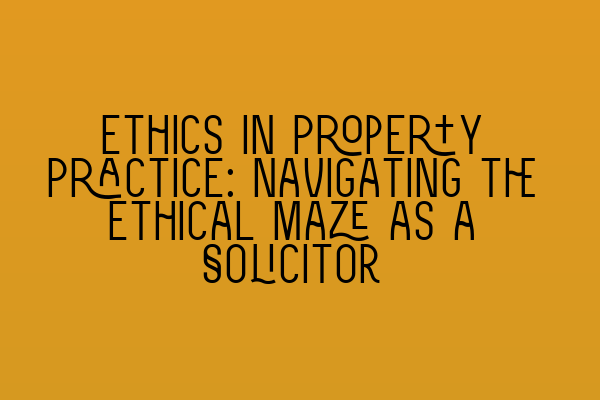Ethics in Property Practice: Navigating the Ethical Maze as a Solicitor
As a solicitor practicing property law, you play a vital role in ensuring that ethical standards are upheld in every transaction. The complex nature of property practice often presents various ethical challenges that can make navigating the ethical maze a daunting task. In this article, we will discuss the importance of ethics in property practice and provide guidance on how to navigate ethical dilemmas effectively.
The Role of Ethics in Property Practice
Ethics form the foundation of the legal profession, and property practice is no exception. The fundamental principles of integrity, honesty, and fairness must guide every decision and action taken by a solicitor in their property practice.
Property transactions involve significant financial and emotional investments for clients, making it crucial for solicitors to act in their clients’ best interests at all times. By adhering to ethical principles, you contribute to building a trusting and reputable profession that clients can rely on.
Furthermore, ethical behavior in property practice promotes the efficient and fair functioning of the property market as a whole. It helps maintain public confidence in the legal system and ensures that transactions are conducted with transparency and integrity.
Common Ethical Challenges in Property Practice
Being aware of the common ethical challenges that may arise in property practice is essential for solicitors to navigate the ethical maze effectively. Here are some of the most prevalent ethical dilemmas you may encounter:
- Conflicts of Interest: As a solicitor, you must identify and manage potential conflicts of interest between yourself, your clients, and other parties involved in a transaction.
- Client Confidentiality: Maintaining client confidentiality is crucial in property practice. You must ensure that sensitive information shared by your clients is kept confidential and not disclosed without proper authorization.
- Transparency and Disclosure: Solicitors have a duty to provide accurate and complete information to clients, ensuring transparency throughout the transaction process.
- Avoiding Unlawful Activities: You must steer clear of any unethical or illegal activities, such as fraudulent or deceptive practices, which could tarnish your reputation and compromise your clients’ interests.
By proactively addressing these ethical challenges and implementing appropriate measures, you can maintain the highest ethical standards in your property practice.
Navigating the Ethical Maze
When faced with an ethical dilemma, it is essential to approach the situation with careful consideration and a clear understanding of your professional and ethical obligations. Here are some steps to help you navigate the ethical maze:
- Identify the Ethical Issue: Determine the specific ethical issue or conflict at hand. Consider whether it involves a potential breach of professional conduct rules, conflict of interest, or any other ethical concern.
- Research and Consult: Conduct thorough research to understand the legal and ethical implications of the situation. If necessary, seek guidance from senior colleagues, professional bodies, or ethics committees.
- Consider Different Perspectives: Evaluate the situation from all angles, considering the interests of your clients, your professional obligations, and the impact on other parties involved.
- Explore Options: Brainstorm possible courses of action that align with your ethical responsibilities. Consider the potential consequences and risks associated with each option.
- Make an Informed Decision: Based on your analysis and the information available, make a well-reasoned decision that upholds your ethical obligations and safeguards the interests of your clients.
- Document and Reflect: Keep a record of your ethical dilemmas and decisions made, reflecting on the outcomes and the lessons learned. This will help you enhance your ethical judgment and situation-handling skills.
Additionally, maintaining regular continuing professional development (CPD) is crucial for staying up to date with the latest legal and ethical developments in property practice. Engaging in relevant training courses, such as SQE 1 Preparation Courses and SQE 2 Preparation Courses, can provide valuable insights and enhance your ethical decision-making abilities.
Remember, navigating the ethical maze requires constant self-reflection, a commitment to lifelong learning, and a genuine dedication to upholding ethical standards in property practice.
To stay updated with the latest SRA SQE exam dates and to practice your legal knowledge, you may also find it useful to check out SRA SQE Exam Dates along with the useful resources like SQE 1 Practice Exam Questions and SQE 1 Practice Mocks FLK1 FLK2.
Conclusion
Ethics play a fundamental role in property practice, ensuring the highest standards of integrity, transparency, and fairness. By navigating the ethical maze with diligence and a commitment to professional ethics, solicitors can safeguard their clients’ interests and contribute to a thriving property market.
Remember, continuous self-improvement, staying informed about the latest legal and ethical developments, and seeking guidance when needed are key to maintaining an ethical approach in property practice.
